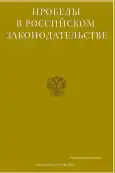Specificity of Tax Regulation in the Conditions of Production Robotization
- 作者: Zakharova S.R.1, Gurnak A.V.1, Moroz V.V.1
-
隶属关系:
- Financial University under the Government of the Russian Federation
- 期: 卷 16, 编号 3 (2023)
- 页面: 63-69
- 栏目: Public Law (State Law) Sciences
- URL: https://journals.eco-vector.com/2072-3164/article/view/568780
- EDN: https://elibrary.ru/CRNSES
- ID: 568780
如何引用文章
详细
This article examines the prerequisites for the emergence, role and prospects for the implementation of the so-called «tax on robots». At the moment, it is already possible to trace the growing trend of displacement and replacement of human labor by machines. Thus, the automation of production processes is becoming more and more popular and beneficial for companies, which jeopardizes the demand for people in the implementation of their labor activities. Moreover, robotization and automation of production cause a number of both positive and negative consequences for the economy and society as a whole. Our task in the implementation of this policy is to propose the most optimal and efficient method of tax regulation of the use of machines that replace and displace workers. However, the difficulty lies in finding the best taxation method that does not limit innovation and does not impede the achievement of economic growth. To do this, it is necessary to determine the meaning of the concept of «robot», to analyze what the main problems may arise in the course of the implementation of the tax policy for taxing robots, then - to outline the main approaches and options for the implementation of their taxation and, focusing on existing world practices, to identify the most acceptable and suitable for us techniques.
关键词
全文:
作者简介
Sofia Zakharova
Financial University under the Government of the Russian Federation
编辑信件的主要联系方式.
Email: sofa.zaharova2014@gmail.com
student of the Faculty of Taxes, Audit and Business Analysis
俄罗斯联邦, MoscowAlexander Gurnak
Financial University under the Government of the Russian Federation
Email: AVGurnak@fa.ru
Cand.Sci.(Econ.), Associate Professor of the Department of Taxes and Tax Administration
俄罗斯联邦, MoscowViktor Moroz
Financial University under the Government of the Russian Federation
Email: mvv88@list.ru
Cand.Sci.(Econ.), Associate Professor, Professor
俄罗斯联邦, Moscow参考
- Tax Code of the Russian Federation [Electronic resource]. URL: http://www.consultant.ru/document/cons_doc_LAW_19671/ (Date of access: 09/05/2017).
- Afonin I. Robots working in Russia should pay taxes on a par with people [Electronic resource]. URL: https://finance.rambler.ru/other/44735365-rabotayuschie-v-rossii-roboty-dolzhny-platit-nalogi-na-rovne-s-lyudmi/ (Date of access: 09/05/2017).
- Goncharenko L. I., Advocatova A. S., Malkova Yu. V. Round table «Actual issues of transformation of taxation in the context of global changes.» Economy. Taxes. Right. - 2020. - P. 170–172.
- Kamaraeva E. Ya., Maksimov N. A., Pyanova M. V. On the tax consequences of robotization National interests: priorities and security. - 2017. - P. 1609–1613.
- Abbott R. and Bogenschneider B. Should Robots Pay Taxes? Tax Policy in the Age of Automation // Harvard Law & Policy Review – 2018 – pp. 146-175.
补充文件










